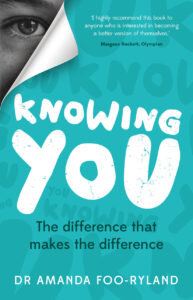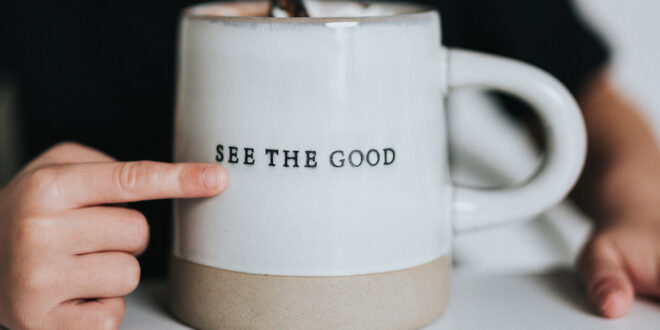 Article extracted from Knowing You by Amanda Foo-Ryland, Panoma Press, RRP $26.99, www.yourlifeliveit.com
Article extracted from Knowing You by Amanda Foo-Ryland, Panoma Press, RRP $26.99, www.yourlifeliveit.com
Let’s talk a little about mindset. If you think that we – the therapists, coaches or counsellors – do the doing, make the changes happen in you, you will go away disappointed. This is why the first thing you and I need to do is look at the empowerment mindset.
This is where you look at your life and at some level accept responsibility for it. Let me give you an example of what I mean.
Imagine you’re a cork. You are bobbing around in the ocean and find yourself washed up on a beach. It’s raining and the sea is grey – best avoided, yet this is where you find yourself.
You say, ‘That’s OK, I have a dream of living in the Maldives and the ocean will take me there one day. It is just a matter of waiting for the right current to come along.’
You wait and you wait. Each tide takes you back and forth from the UK to Ireland. Back and forth you go. You ride the waves, hoping that one day an external current will take you to your dream location.
It never does. You, the little cork, will get old and find yourself wherever the old corks go, all speaking from a script that sounds something like this:
‘I always dreamt of living in the Maldives, it just never happened for me. The current never took me. I wasn’t one of the lucky ones.’
Many people spend a lifetime waiting for an external factor to change so that their life can be changed. Winning the lottery; getting a better job; starting a new relationship; their spouse to be more… ( fill in the gap); moving house; making more money; being in better health – you get the picture. Yet it never happens.
External elements don’t make our lives better. It is how we take control of our lives once we see that we can take charge, change course; that we are the navigator. Then things start to change.
Life Happens For You
A student who came on one of the live courses led by my team and me in New Zealand really loved the concept of being in control and learning from what life deals us. He shared with us that he applies empowerment thinking to his life most of the time; he lives and breathes the empowerment mindset framework.
He was introduced to it many years ago when he was only seventeen and read a book called Think and Grow Rich by Napoleon Hill. This iconic book changed his life. He applied the principles of the empowerment mindset and took control. His path changed; he grew; he knew what was good for him, what to avoid. Most importantly, he became the captain of his own ship, not a cork being taken by the tide.
When we are expecting things to change for us, people to change around us, life to deal us a better card, then life is happening to us. We are at the mercy of whatever comes our way and we blame whatever that is for our circumstances. This leads to a blame mentality.
I did this when I got kidney cancer. I defaulted to ‘Why me? How did this happen to me?’ I was the fittest I had ever been. I had just cycled from Land’s End to John O’Groats with two friends, Malcolm and Jonny. For a joke, I’d suggested we threw the National Three Peaks in for good measure, so not only had we cycled the length of the UK, but we had also climbed the height of it.
When I returned to New Zealand, I was having a routine health check. My blood pressure was high so I went to see the local GP, a lovely lady called Tracey. When someone saves your life, you tend to remember their name.
She suggested I take blood pressure tables, which I declined. She could have told me to get on my way for refusing to take the prescriptions she had suggested; instead, she recommended we run an ultrasound.
The truth is, if I’d taken the prescription, I would not be here today.
The truth is, if she hadn’t been vigilant, I would not be here today.
I was fortunate. The scan showed a tumour the size of a golf ball in my left kidney. Surgery was planned immediately.
I felt like life was happening to me. How could this be? I was so fit, and yet here I was sitting opposite a urologist and he was telling me I had cancer.
I decided that I needed to think differently. Rather than life happening to me, I had to believe that life was happening for me.
When we think that life is happening for us, it allows us to look for the bigger meaning. It allows us to look for the learnings from the obstacles in our path, the problems we face along the way, and ask ourselves what each one has been sent to teach us. With this new mindset of life happening for me, I started to look at what this cancer could mean.
With my diagnosis of cancer, people who’d been through a similar illness came to help me. They gave me books that they found helpful, told me stories about people who had overcome the disease. Sometimes they shared things with me that were not so helpful. Not intentionally, of course; they just didn’t really know what to say.
I decided to look upon cancer as an adventure I hadn’t chosen to go on, but as I was on it anyway, I might as well make the most of it. With the mindset of life happening for me, I was able to look at what cancer was going to teach me. What is around the corner? What can I learn?
This mindset served me really well. As somebody who had never been into hospital before, I found it interesting that when I looked at it as an adventure, I became curious about the experience. Rather than being fearful, I looked at the experience through childlike eyes.
When the anaesthetist came to meet me on the morning of the surgery, she told me she was going to give me a little concoction to make me feel calm. I asked her if I could remain awake and see the operating theatre as I’d never seen one before, apart from in the movies. She clearly thought this was a weird suggestion, but went along with it anyway.
This turned out to be quite good fun. I met with the team that would be operating on me, saw the operating theatre, which was super shiny, and how tiny the table was where the operation would take place. That alarmed me somewhat; I remember asking how on earth I was going to stay put on that tiny table. The anaesthetist told me not to worry.
‘The team will strap you down. In fact,’ she added, ‘why don’t you jump on there now? It will make it easier for the team.’ That’s exactly what I did – I was so relaxed and curious about it all, I hopped on to my own operating table before major surgery.
I don’t mean to imply that you must live your life from this mindset the whole time. That would be impossible; as humans, we are emotional beings and sometimes strong emotions can affect our mindset. At a time when fate threw an immense curveball my way, though, the mindset of life is happening for me allowed me to be curious every turn, learning all I could from cancer.
There will be times when you want to blame other people for your circumstances, blame the environment, blame the situation itself. That’s OK, but know that while you’re in a blame mentality and thinking life is happening to you, then you are powerless. You’ll stay stuck where you are. The longer you stay there, the more stuck you’ll become.
When my team and I work with clients, we recognise how important it is that they appreciate which mindset they are currently operating from. If they’re coming from a mindset of life is happening to them and it’s everybody else’s fault that they are where they are, then sadly, change will not happen for them. Why? Because they are expecting an external force to do the changing for them – someone else to implement it or an alteration to happen in the environment which will then change their situation.
This is an illusion.
We must take control, as hard as it may seem. Curveballs happen. Life can be going well, and then from nowhere with no warning, it falls apart in a heartbeat. Knowing that we have a choice to be either stuck or empowered, we need to choose the latter as this will give us more resilience than we would ever have believed possible.









Join the Discussion
Type out your comment here:
You must be logged in to post a comment.